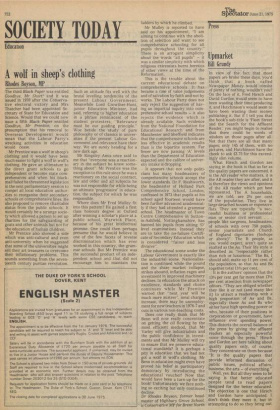SOCIETY TODAY
Education
A wolf in sheep's clothing
Rhodes Boyson, MP
The third Black Paper was entitled Goodbye, Mr Short! and it was issued in 1970 after the Conservative electoral victory and Mrs Thatcher had been appointed Secretary of State for Education and Science. Would that we could now issue a fifth Black Paper entitled Goodbye, Mr Prentice, on the presumption that his removal to Overseas Development would mean that the Labour Party's wrecking activities in education would cease.
Mr Prentice was a wolf in sheep's clothing and it would have been much easier to fight a wolf in wolf's clothing. He gave an ultimatum to the direct grant schools to go independent or become state comprehensives and when his blackmail failed he threatened legislation in the next parliamentary session to compel all local education author_ ities to reorganise their secondary schools on comprehensive lines. He also proposed to remove charitable status from the public schools. It would certainly be a strange society which allowed a person to set up charities for the safeguarding of goats and other animals but not for the education of human children.
Mr Prentice also showed a side which was anti-cultural and even anti-university when he suggested that some of the universities might sell their art treasures to overcome their inflationary problems. This sounds something from the seventeenth century puritan revolution. Such an attitude fits well with the brutal levelling tendencies of the present Labour Government. Meanwhile Lord Crowther-Hunt, junior Education Minister, had said, referring to higher education in a phrase reminiscent of the student protesters, "Relevance must be our guiding principle." Woe betide the 'study of pure philosophy or of classics in universities if the present Labour Government and relevance have their way. We are surely heading for a new dark age.
Mr Kingsley Amis once said to me that "everyone was a reactionary in the subject he knew something about". Mr Prentice was the exception to this rule since he was a reactionary on the social contract, law and order and all subjects he was not responsible for while being an ultimate 'progressive' in education, the subject for which he was responsible. '
Where does Mr Fred Mulley fit into this pattern? He gained a first class honours degree at Oxford after winning a scholar's place at a public school, Warwick Place, because of his great intellectual promise. One could then perhaps presume that he would believe in one of the few facets of reverse discrimination which has ever worked in this country, the grammar schools. But Mr Prentice was the successful product of an inde-. pendent school and that did not encourage him to maintain the
ladders by which he climbed.
Mr Mulley is reported to have said on his appointment, "I am aiming to continue with the abolition of selection and want to see comprehensive schooling for all pupils throughout the country." There is an arrogant simplicity about the words "all pupils" — it was a similar simplicity with which religious extremists burnt heretics of other views at the time of the Reformation.
This is the trouble about the current educational debate on comprehensive schools. It has became a case of value judgements and of salvation by faith an not by works. The Labour Party does not only reject the suggestion of having an impartial inquiry into comprehensive school results — it also rejects the evidence which is already available. Such evidence from the National Foundation for Educational Research and from Manchester and Sheffield indicates that the comprehensive schools are less effective in academic results than is the bipartite system. Far 'fewer are now passing 'A' levels than the Department of Education expected and the calibre of university intake is dropping.
It appears that not only politicians but many headmasters of comprehensive schools accept the lower standards. Dr F. Rushworth, the headmaster of Holland Park Comprehensive School, London, confessed in 1973 that pupils at his school aged fourteen would have been further advanced academically if they had attended a grammar school. The headmaster of Town Centre Comprehensive in Suttonin-Ashfield, Nottinghamshire, has banned his pupils from sitting '0' level examinations. Instead they are to take the no-failure Certificate of Secondary Education which is considered "fairer and less divisive".
The educational scene under the Labour Government is exactly like the industrial scene. Nationalisation is continued while the pound and the share market collapse, strikes abound, inflation rages and investment in improved machinery declines. In education the attack on excellence, standards and choice continues while Mr Prentice warned that "next year will be much more austere", meal charges increase, there may be unemployment for new teachers in 1976-7 and cuts in various non-teaching costs.
Does one really think that Mr Benn will now really concentrate on getting the oil flowing by the most efficient method, that Mr Varley will give industrialists and the public confidence in investments and that Mr Mulley will try to ensure that we preserve educational standards? It is perhaps a pity in education that we had not got a wolf in wolf's clothing. Mr Benn in education might even have proved his belief in participatory democracy by introducing the educational voucher! Now that would have been a turn-up for the book! Unfortunately we face nothing so exciting but only continued decline.
Dr Rhodes Boyson, former headmaster of Highbury Grove School, is Conservative MP for Brent North


































 Previous page
Previous page